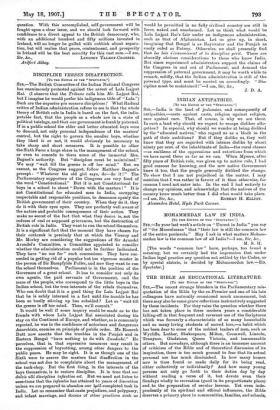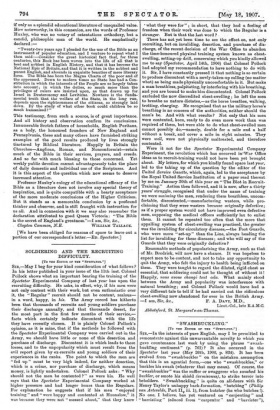THE BIBLE AS EDUCATIONAL LITERATURE. [To TIIS EDITOR 07 7711 "SPLOCA707.1
SIR,—The recent strange blunders in the Parliamentary misquotation of the Bible by the ex-Premier and one of his late colleagues have naturally occasioned much amusement, but there may also be some grave reflections instructively suggested by these incidents. For they raise the question whether there has not taken place in these modern years a considerable falling-off in that frequent and reverent use of the Scriptures which was formerly a characteristic of so many households and so many loving students of sacred lore,—a habit which has been dear to some of the noblest leaders of men, such as Wycliffe, Luther, Shakespeare, Milton, Cromwell, Lincoln, Tennyson, Gladstone, Queen Victoria, and innumerable others. But nowadays, although there is an immense amount of criticism of the Bible and of theoretical discussion of its inspiration, there is too much ground to fear that its actual personal use has much diminished. In how many homes now is time found or made daily for its being read, either collectively or individually? And how many young persons not only go forth to their duties day by day without reading a verse of it, but devote even their Sundays wholly to recreation (good in its proportionate place) and to the preparation of secular lessons. Yet even independently of its spiritual and ethical influences, the Bible deserves a primary place in communities, families, and schools, if only as a splendid educational literature of unequalled value. How noteworthy, in this connexion, are the words of Professor Huxley, who was no votary of ostentatious orthodoxy, but a candid, philosophic man of the world. He emphatically declared :—
" Twenty-two years ago I pleaded for the use of the Bible as an instrument of popular education, and I venture to repeat what I then said :—Consider the great historical fact that, for three centuries, this Book has been woven into the life of all that is best and noblest in English History, and that it has become the National Epic of Britain, and that it is written in the noblest and purest English, and abounds in exquisite beauties of mere literary form. The Bible has been the Magna Charts of the poor and of the oppressed. Down to modern times no State has had a Constitution in which the interests of the People are so largely taken into account; in which the duties, so much more than the privileges of rulers are insisted upon, as that drawn up for Israel in Deuteronomy and Leviticms. Nowhere is the funds.: mental truth that the welfare of the State, in the long run, depends upon the righteousness of the citizens, so strongly laid down. By the study of what other book could children be so much humanized?"
This testimony, from such a source, is of great importance. And all history and observation confirm its conclusions. Innumerable Scotch fathers of households, English Puritans, as a body, the honoured founders of New England and Pennsylvania, these and many others have furnished striking examples of the good results produced by lives strongly tinctured by Biblical literature. Happily in Britain the Churches—Anglican, Roman, and Nonconformist—retain much of the Bible in their services, prayers, and creeds. And so far with much blessing to those concerned. Yet weekly public devotion cannot advantageously take the place of daily domestic and individual use of the Scriptures. And it is this aspect of the question which now seems to deserve increased attention.
Professor Huxley's eulogy of the educational efficacy of the Bible as a literature does not involve• any special theory of inspiration, and is quite compatible with a hearty acceptance of the more moderate conclusions of the Higher Criticism. But it stands as a memorable conclusion by a profound thinker and observer, and is still fraught with instruction, for us all. And in connexion with it we may also remember the declaration attributed to good Queen Victoria : " The Bible is the secret of England's greatness."—I am, Si;', &c., . Clapton Common, N.E. WiLLIAM TALLACK.
[We have been obliged for reasons of space to leave out a portion of our correspondent's letter.—ED. Spectator.]







































 Previous page
Previous page